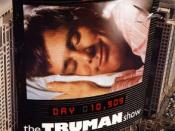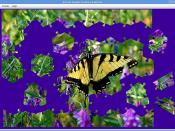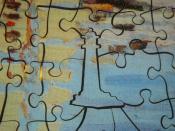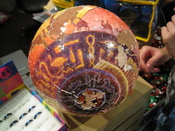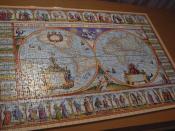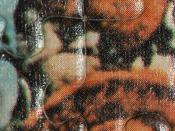As a change of worlds is a result of our experiences, we must overcome boundaries in order to ensure a change in a positive direction. Change is necessary for growth and progress, and without it, life would be awfully stagnant. These ideas are explored extensively in Peter WeirÃÂs film ÃÂThe Truman ShowÃÂ, Miroslav HolubÃÂs poem ÃÂThe DoorÃÂ and John MarsdenÃÂs novel ÃÂWinterÃÂ.
ÃÂThe Truman ShowÃÂ directed by Peter Weir takes place in Seahaven, a fictional community that houses Truman Burbank, an orphan who is the first baby to be adopted by a media corporation and consequently used as the protagonist for a ÃÂreality soap operaÃÂ, screened 24 hours a day. TrumanÃÂs ÃÂfatherÃÂ is Christoff who is not just the director, but also the ÃÂcreatorÃÂ of this T.V series. The ironic aspect of this movie is the fact Truman is unaware his whole life is a studio production until that fateful day when a studio light falls unexpectedly before him.
Over the course of the film Truman realises that his perceived utopian reality is not really ÃÂtrueÃÂ and attempts an escape to the dystopic ÃÂreal worldÃÂ.
Truman may be viewed as a prototypical adolescent at the beginning of the movie. He feels trapped into a familial and social world to which he tries to conform while being unable to entirely identify with it, believing that he has no other choice (other than through the fantasy of fleeing to Fiji in search of Sylvia ÃÂ his lost love). Eventually, Truman gains sufficient awareness of his condition to 'leave home' ÃÂ developing a more mature and authentic identity as a man, leaving his child-self behind and becoming a True-man. This shows how a change of worlds can arise as a result of multiple experiences, united together as one revolutionary force.
Towards the end of the movie, after a overcoming a great tempest sent by Christoff in order to prevent Truman from leaving Seahaven by boat, Truman is faced with a most difficult obstacle ÃÂ himself. Just as Truman opens the door to leave the set, Christoff attempts to lure Truman back into his artificial world, as he says ÃÂThereÃÂs no more truth out there than there is in the world I have created for you. The same lies, the same deceit, but in my world you have nothing to fear. I know you better than you know yourself.ÃÂ Truman faces a most powerful internal struggle as he is torn between returning back to the safe, yet false world he once knew, or to sacrifice his security and step through the doorway into the unknown in order to attain freedom. This relates to the idea that no matter what, there will always be obstacles to overcome when one wants to effectively change their world for the greater good.
The idea of the door being a symbol of change can also be seen in the poem ÃÂThe DoorÃÂ by Miroslav Holub. The poem effectively presents a dramatic monologue as we do not hear any comments from the listener, who seems too frightened and too timid to take the action, which the speaker prompts. The poet uses a persuasive and insistent tone, opening with the imperative command, ÃÂGo and open the doorÃÂ which repeats multiple times throughout the poem. The "door" itself is a metaphor for the barrier that stops a person from seeing ÃÂwhat's out there" in life, or, in a more internal sense, what is inside your heart. The ÃÂdoorÃÂ is a barrier that can only be broken if a person takes the initiative to take a chance and "open" it.
The concept of changing worlds is explored extensively by this poem on physical, social and emotional levels. The use of colloquial language in the poem gives a strong sense of immediacy, and the lack of rhythm, rhyme and conventional structure also give the poem a conversational tone which engages and holds the attention of the reader. The poem delves into the fears that often accompany change, as was also displayed in ÃÂThe Truman ShowÃÂ. The audience feels as if behind the door there is a sense of confinement and rigidity, while beyond it there is a world limited only by oneÃÂs imagination. This world beyond the door offers freedom and opportunity, something that cannot be found unless one takes the courage to open the door. The poem "The Door" demonstrates to us that change in self involves taking chances and the positive consequences of change. Holub expresses change as an individual's commitment to embrace new opportunities presented to them, leading to a new perspective of life.
The novel ÃÂWinterÃÂ by John Marsden revolves around a sixteen year old girl named Winter and her path of personal growth. Winter returns to her home town of Warriewood, which sparks a chain of cataclysmic events that cause Winter to explore the mysteries of her shadowed past; thus guiding her along her personal journey of growth. This shows how change is necessary for growth and progress. Winter grows from being a stubborn, rude, selfish and rather introverted girl, to being a warm and determined young lady, able to open up to people and form new relationships.
WinterÃÂs parents had died when she was merely four years old; a most world-changing event for such a young girl. She was sent to live with relatives in Canberra who often neglected her, and could only dream of her previous life in Warriewood. The reader also discovers that Winter has lost a part of her identity between the change of worlds as she says, ÃÂI was like the guy in some movie I saw, cutting bits out of magazines: eyes, eyebrows, a nose, a chin, desperately trying to put together the face of a woman heÃÂd met once and lost.ÃÂ This is a direct reference to ÃÂThe Truman ShowÃÂ as Truman is seen cutting out pieces from various magazines to put together a portrait of Sylvia. This jigsaw puzzle can be seen as an allegory of both Winter and Truman wanting piece together the ÃÂjigsaw puzzleÃÂ of their own life and identity. However, both characters are forced to use pieces from other people in order to form this picture, as they lack the resources to create their own image. This correlates to the idea of change being necessary for growth and progress. This shows how in order to ensure a change in a positive direction, there are always boundaries to overcome.
As is shown in Peter WeirÃÂs ÃÂThe Truman ShowÃÂ, Miroslav HolubÃÂs ÃÂThe DoorÃÂ and John MarsdenÃÂs Winter, a change of worlds is a result of our experiences. Change is necessary for growth and progress, and without it, life would be awfully stagnant. Thus, we must overcome boundaries in order to ensure a change in a positive directionBibliography:'The Truman ShowÃÂ - Peter Weir 1998ÃÂThe DoorÃÂ - Miroslav HolubÃÂWinterÃÂ - John Marsden
